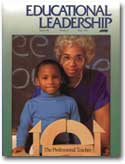Like Jonathan Kozol, I am very much opposed to vouchers (November 1992, pp. 90–92). Vouchers are usually meant to allow parents to spend public money at private schools. This indeed can (I think, will) aggravate the fragmentation of American society that Kozol is concerned about. The use of vouchers, though, is not the same as school choice. Public schools of choice provide a diversity of teaching/learning styles, curricular emphases, or organizational structures to coexist within one educational agency. Choice is an acknowledgment that what is right for my child may not be right for your child.
I also agree with Kozol that choice is often used by the affluent or the savvy to escape dreary neighborhood schools and send their children to “boutique” schools. The children of the poorest families do not have equal access to the information about their choices and thus do not really have an equal choice. Kozol gives us startling statistics showing how choice has been misused in such paired districts as Brockton and Avon, Massachusetts. None of these examples negates the concept of public schools of choice, however. I too am old enough to remember the history of this notion, but I do not think that the historical misuse of an idea should be a basis for rejecting it, nor should the present misuse be.
I teach in Connecticut and have been involved with “choice” in New Haven, Danbury, East Hartford, and Southington. These communities differ widely in demographics, economics, and in public support for education. In each district the particular model that has developed for school choice has been different. What they all have in common, though, is that students, parents, teachers, and the community are better served by having these options available.
I believe that we can learn from our mistakes and from our successes. Where schools of choice have been misused, let's learn how to control the process better so that information and access are more equal. We also have enough experience to see better ways of making schools of choice work. These schools engage parents, children, and teachers in a shared commitment to quality education. Successful models should be disseminated among other districts. Far from particularizing loyalties, these schools are hotbeds for community involvement. When people become empowered and energized about one public school, all public schools benefit.
